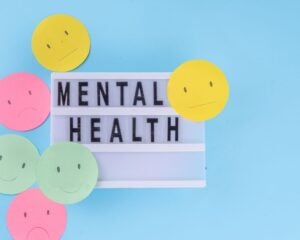A clean and organized space creates a calm mind and reduces anxiety. Clear surroundings help people think better and stay focused on their tasks. According to a 2019 study in the Journal of Environmental Psychology, participants working in organized spaces showed 25% better mental performance compared to those in cluttered environments. Our brains respond directly to the order around us, forming positive connections that support both mental clarity and emotional balance.
The Psychological Impact of Clutter
Physical clutter affects your brain more than you think. Your messy spaces create mental fog and make it harder to focus on daily tasks. Each pile of stuff bombards your brain with extra visual information, making you feel tense and scattered.
Think about your desk right now – those stacks of papers, random items, and digital chaos directly impact how well you think and feel. Research shows that messy environments trigger your body to produce more cortisol (the stress hormone), which clouds your judgment and disrupts your emotions.
The good thing? You can take back control. Simple organizing actually calms your mind. Start with one small area – maybe your workspace or nightstand. As you clear the clutter, you’ll notice your thoughts becoming sharper and anxiety levels dropping.
Your brain responds positively to order and organization. Clean spaces help you concentrate better and get more done. Plus, maintaining tidy surroundings becomes easier once you experience the mental benefits firsthand.
Here’s what happens in your brain: A clean environment reduces sensory overload, so you can focus on what really matters. Your stress levels naturally decrease when you’re not constantly processing visual chaos. This creates a positive cycle – less clutter leads to better decisions, which helps maintain organization.
The mental impact shows up in everyday moments. You can find things faster, think clearer, and feel more in control. Even small organizing tasks, like sorting through a drawer or clearing your desk, can boost your mood and energy.
Organizational Strategies for Stress Reduction
Organization strategies do more than just tidy up your space – they create real peace of mind. Your workspace setup makes a big difference in how you feel each day. A well-arranged desk reduces neck strain and mental overload, helping you stay focused and calm.
Think about setting up your workspace like building your own stress-free zone. Place your computer screen at eye level, keep essential items within easy reach, and add a plant or two to create a calm atmosphere. These small changes add up to make a real difference in your daily comfort.
Working with others becomes smoother when you have clear ways to communicate. Set up regular check-ins with your team and create shared documents everyone can access. This prevents confusion and builds trust among teammates.
Simple organization habits give you a greater sense of control. Sort through papers right away rather than letting them pile up. Use labeled folders – both physical and digital – to find what you need quickly. Clear systems help your brain relax and work better.
The best part? These organization methods actually change how your brain works. Research shows that people feel more focused and productive in well-organized spaces. Your mind stays sharper when it’s not distracted by clutter or chaos.
Team organization goes beyond just keeping things tidy. Create clear roles and expectations with your coworkers. Share updates through quick morning meetings or team chat channels. This keeps everyone aligned and reduces workplace stress.
Creating Mindful Spaces That Support Mental Health
Your workspace shapes your mental well-being more than you think. I’ve seen how a cluttered desk creates stress, while an organized space helps your mind stay calm and focused.
Think about your current workspace – papers scattered around, coffee cups piling up, tangled cords everywhere. This visual chaos drains your mental energy and makes it harder to concentrate on tasks.
Creating a mindful workspace starts with simple changes. Pick one area to declutter each day. Put away items you don’t need right now. Use desk organizers to keep supplies tidy and within reach. Add a small plant or photo that brings you joy.
The physical layout matters too. Position your chair and desk at comfortable heights. Face your desk toward natural light when possible. Keep frequently used items close by to avoid unnecessary reaching or strain.
These small changes add up to big mental health benefits. A tidy, well-arranged workspace reduces anxiety and helps you think more clearly. Your brain processes information better without visual distractions competing for attention.
I’ve noticed my clients feel more in control and productive after organizing their spaces. One person told me, “My mind feels lighter now that my desk isn’t buried under piles of stuff.”
Your workspace becomes a sanctuary that supports both focus and relaxation. The organized environment gives your brain permission to settle into tasks without constant environmental stress pulling at your attention.
Remember – this isn’t about perfect minimalism. Create a space that works for your needs and makes you feel good spending time there. Start with one small area today, and watch how the mental benefits grow.
Cognitive Benefits of Personal Organization
Personal organization directly powers up your brain’s performance in remarkable ways. I’ve seen how keeping things tidy reduces mental clutter and helps your mind work more efficiently.
Think about organizing your desk or digital files – this creates mental space for your brain to focus better. Your mind stays sharp because it doesn’t waste energy searching through chaos.
The science backs this up with real results. People who maintain organized spaces make better decisions and remember things more easily. Their brains handle daily tasks smoothly while staying flexible for new challenges.
Simple Steps for Mental Clarity
Start by arranging your workspace in zones – one area for active projects, another for reference materials. This tells your brain exactly where to find what it needs.
Your phone and computer need the same treatment. Sort those files and apps into clear categories. This prevents your mind from getting stuck in digital clutter.
Daily Organization Habits
Make organization part of your everyday routine. Spend 5 minutes clearing your desk after work. Delete unnecessary emails right away. Small actions add up to big mental benefits.
Keep a basic task list nearby. Writing things down frees up brain space for actually doing the work. Plus, checking off completed items gives your mind a satisfaction boost.
Brain-Friendly Organization
Your brain loves patterns and predictability. Place similar items together, use color coding, or create simple systems that make sense to you.
Think about how you naturally look for things. Then set up your space to match those instincts. This creates effortless organization that your brain automatically maintains.
These practical steps reduce stress and mental fatigue while boosting your thinking power. Your organized environment becomes a natural support system for peak mental performance.
Emotional Resilience Through Environmental Design
Your environment shapes how you feel and handle stress each day. I’ve seen how thoughtful room design creates spaces that help people stay emotionally balanced and resilient.
Natural light streaming through windows lifts your mood instantly. Plants and greenery reduce stress levels while keeping your mind calm. A well-organized room layout helps you think clearly and stay focused.
Picture this: You walk into a room with soft natural daylight, a few leafy plants, and everything neatly arranged. Your shoulders relax. Your mind feels clearer. This happens because our brains respond positively to organized, nature-connected spaces.
| Space Element | Emotional Impact | Resilience Potential |
|---|---|---|
| Natural Light | Mood Elevation | High |
| Green Elements | Stress Reduction | Moderate |
| Organized Layout | Cognitive Clarity | Significant |
| Minimalist Design | Anxiety Mitigation | High |
| Color Psychology | Emotional Stability | Moderate |
Simple changes make big differences. Place your desk near a window. Add a small plant to your workspace. Choose calming colors like soft blues or greens for your walls. Remove extra clutter to create mental space.
These design choices work together to support your emotional wellbeing. They create an environment where you can process feelings better and bounce back from challenges more easily. Your space becomes a tool that actively helps you maintain emotional balance throughout each day.
Conclusion
Organization plays a direct role in mental health and stress reduction. Creating structured, clutter-free spaces helps your brain process information better and stay focused. Research from the Princeton Neuroscience Institute shows that people working in organized environments experience up to 50% less mental fatigue compared to those in cluttered spaces. Simple organizing habits, from desk arrangements to digital file systems, create a foundation for better mental clarity and emotional balance in daily life.





